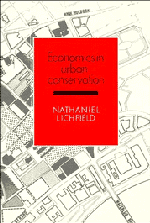Book contents
- Frontmatter
- Contents
- List of diagrams, tables and plans
- Preface
- Acknowledgements
- Introduction
- Part I Planning and management in the conservation of the urban system
- Part II Conservation of the cultural built heritage
- Part III Economics in urban conservation
- 7 Economics in the management of the built environment
- 8 Economics in the conservation of the CBH
- 9 Economics in planning for conservation of the CBH
- 10 Valuation of the cultural built heritage
- 11 Screening of the inventory or list
- 12 Who benefits and who loses from conservation of the CBH?
- Part IV Selected tools of economic analysis for project evaluation
- Part V Case studies in the economics of conservation of the CBH
- Notes
- Bibliography
- Index
9 - Economics in planning for conservation of the CBH
Published online by Cambridge University Press: 10 November 2010
- Frontmatter
- Contents
- List of diagrams, tables and plans
- Preface
- Acknowledgements
- Introduction
- Part I Planning and management in the conservation of the urban system
- Part II Conservation of the cultural built heritage
- Part III Economics in urban conservation
- 7 Economics in the management of the built environment
- 8 Economics in the conservation of the CBH
- 9 Economics in planning for conservation of the CBH
- 10 Valuation of the cultural built heritage
- 11 Screening of the inventory or list
- 12 Who benefits and who loses from conservation of the CBH?
- Part IV Selected tools of economic analysis for project evaluation
- Part V Case studies in the economics of conservation of the CBH
- Notes
- Bibliography
- Index
Summary
The similarity and distinction of purpose in economics and planning
As indicated above (Chapter 3), planning for conservation is seen as part of urban planning. Accordingly we here see the economics of planning for conservation as part of the use of economics in urban planning. Such use is not all that straightforward. It is thus necessary to introduce it as a preliminary.
There is a decided tendency for planners and economists to mutually consider the other inimical to their purpose. For this there need be no fundamental reason, considering that they have some identity of purpose. While open to controversy, economists would generally accept as a starting point the classic statement of Robbins, ‘economics is a science which studies human behaviour as a relationship between ends and scarce means which have alternative uses’. Amongst economists this formulation calls for planning. Two brief references from economists of different views will rub home the point. Even Hayek can say:
All economic activity, in particular, is planning decisions about the use of resources for all the competing ends. It would therefore seem particularly absurd for an economist to oppose ‘planning’ in this most general sense of the word … The dispute between the modern planners and their opponents … is not a dispute on whether we ought to choose intelligently between the various possible organisations of society … It is a dispute about what is the best way of so doing.
- Type
- Chapter
- Information
- Economics in Urban Conservation , pp. 152 - 166Publisher: Cambridge University PressPrint publication year: 1989



